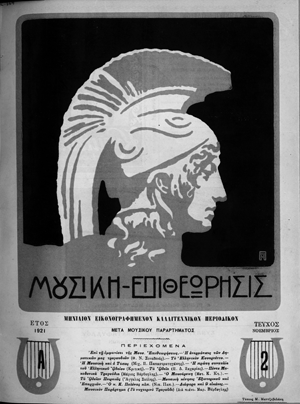Musike Epitheoresis = Μουσική επιθεώρησις
Prepared by Ioannis Fulias
Online only (2010)

Musike Epitheoresis (Μουσική επιθεώρησις / Music Review) [MEP], an illustrated art periodical accompanied by a music supplement, was published in Athens during one twelve-month period. The first four issues are dated October 1921 through January 1922; a double issue for nos. 5 and 6 represents February-March, 1922; four issues (nos. 7-10) cover the months from April to July 1922, while the last issue, a double one (no. 11-12) is for August-September, 1922. MEP is one of only two Greek music periodicals that were in concurrent circulation at the beginning of 1920s, and is unique in its orientation towards Greek and European art music at a time when most Greek music periodicals dealt with Byzantine church music and Greek traditional music.
The editor of issues nos. 1-6 was the chanter and choirmaster Nikolaos G. Pappas (1888-1957), one of the first graduates of the Byzantine Music School of the Athens Conservatory. Pappas was well informed in Western music, but in April 1922 he was recruited by the army and left the editorship. For issues nos. 7-12 Theodoros N. Synadinos (1880-1959) assumed the role of editor. Synadinos was an experienced journalist and newspaper and periodical editor, who followed the development of music of Greece, siding with those who supported the development of western European and Greek art music.
The single issues of Music Review (nos. 1-4 and 7-10) comprise of sixteen independently numbered pages, while for the double issues (nos. 5-6 and 11-12) the number of pages increases to twenty four. In most issues the content is printed in two-column format, while the font size occasionally varies. Cover pages are not numbered. Each issue contains a music supplement of four pages that are numbered independently.
The contents of MEP are organized with main articles and tributes to significant personalities or institutions placed in the first half of each issue, while various other texts of shorter length ─ commentaries, presentations, letters, reviews, the latest news and correspondence about musical life in Athens, the Greek provinces and abroad ─ follow.
Among the main articles are those which refer to contemporary music institutions and Greek musicians. The title “From our Music Institutions” deals with the Philharmonic of Aegio, the Piraeus Conservatory, the Conservatory of Thessalonica, the Athenian Mandolin Orchestra, all the music institutions of Volos since the early twentieth century, and the Opera School of the Athens Conservatory. Of interest are articles on the artistic activities of Lykoudis’ “Hellenic Quartet”, the five-year-old prodigy pianist Rena Kyriakou, and the stage director and impresario Costas Christomanos. In addition there are extended tributes to foreign musicians such as to Saint-Saëns and Arthur Nikisch. Greek and Hungarian folk songs and their utilization in the field of art music are discussed at length. Under Synadinos’ editorship his own lectures on the various genres of the Greek song, and Georgios Lambelet’s study on music and poetry were published. Other notable writings include P. Zacharias’ critique on the curriculum of studies offered by various conservatories, Synadinos’ article criticizing the operetta composer Sakellaridis for artistic populism and commercialization, M. Kalomiris’ lecture on the future development of Greek music and N. Vergotis’ retort on this matter.
Among the collaborators of Music Review are prominent figures of the Athenian music scene, such as the composers (and occasionally conductors) Dionysios Lavrangas (1860-1941), Georgios Lambelet (1875-1945), Armand Marsick (1877-1959), Manolis Kalomiris (1883-1962), Marios Varvoglis (1885-1967), Georgios Sklavos (1888-1976), and Petros Petridis (1892-1977). The researcher of ancient Greek, Byzantine and folk music Prokopios Zacharias (1873-1957), the founder of the homonymous music editions Stephanos Gaitanos, as well as the leading chanter and theorist of Byzantine music Constantinos Papademetriou (1889-1947) also contribute significant articles.
In the music supplements harmonizations and arrangements of Greek folk songs for voice and piano by Armand Marsick, Stephanos Valtetsiotes, Georgios Sklavos, and Nikolaos Lavdas are prominent. Original compositions include songs for voice and piano by Georgios Lambelet, Dionysios Lavrangas and Georgios Axiotis, and short pieces for piano by Marios Varvoglis and Stephanos Gaitanos.
The present publication is based on copies of issues nos. 1-10 borrowed from the Musical Folklore Archives of the Center of Asia Minor Studies, and on the complete set of issues at the Hellenic Literary and Historical Archive.
